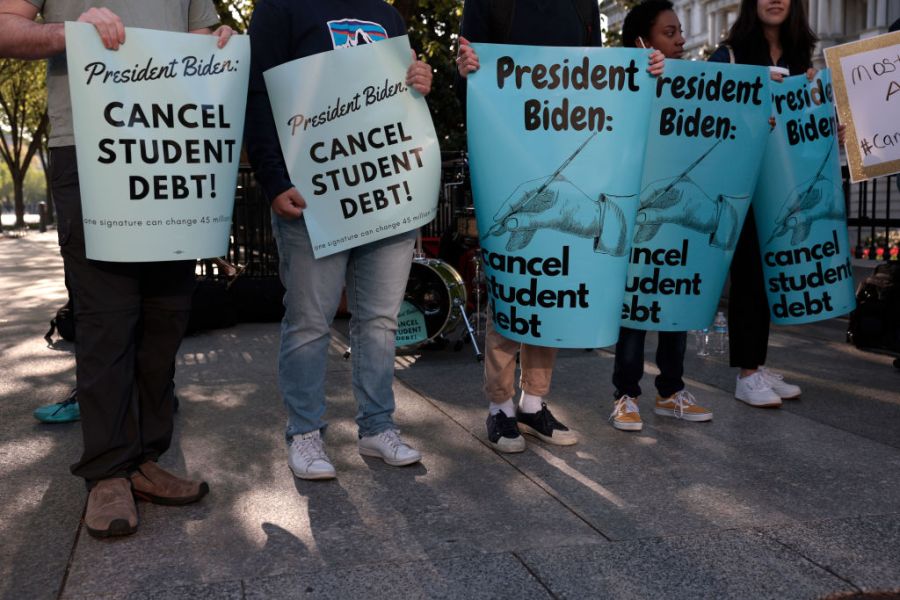When is My Student Loans Due if I Graduate With an Associate s Degree but Continue on

On August 24th, President Biden announced his plan for student debt forgiveness. As the White House has been suggesting for many months, Biden opted to cancel $10,000 in student debt for debtors who make under $125,000 a year. He granted an additional 10k in forgiveness to students and former students with Pell Grants, and extended the payment pause through the end of the year.
For some, this means not having to think about student loan payments ever again! Or at least not until you go back to school for that mid-life career change. For others though, it means that the end of the student loan payment pause is in sight. Many former students have questions about how to use these next few months. For example, is it wise to start making payments now if you can afford to do so? We're delving into everything you need to know about how the student loan landscape has changed in the face of the pandemic — and how you can budget for your loan payments to resume in the near future.
Since payment suspension is meant to protect borrowers, there are a few provisions in place to ensure this program doesn't cause unintended harm to those it's meant to help. Although student loans can be notoriously unforgiving, skipping monthly payments during the pause won't hold the usual consequences for borrowers.
Notably, interest has not accrued on existing student loans during this non-payment period. The suspension is a true pause on both interest and payments — something that's relatively unheard of, especially given just how crushing student debt is for so many Americans. When payments resume, borrowers will owe the same principal amount, and have the same accrued interest, they owed before the payment suspension began. For most traditional payment plans, loan terms will be extended for the length of time that pandemic protections lasted.

However, not all repayment programs work in the same way. For example, some borrowers are enrolled in programs wherein the total number of months spent actively making payments earns them loan forgiveness. The Public Service Loan Forgiveness program is one such initiative, but there are also various income-driven loan forgiveness programs. Although payments are not due during this pause, the months still count in the borrower's favor when it comes to these forgiveness programs.
Another great piece of news? As part of the stimulus package that was approved back in March 2021, forgiven student loans are now tax-free until 2025. Before that, borrowers who had federal loans forgiven would still have to pay taxes on the loan. Now, borrowers can have loans forgiven without incurring a tax debt.
Should Federal Student Loan Borrowers Continue Making Payments Despite the Pause?
Some borrowers who may not have had their source of income impacted by the fallout of the COVID-19 pandemic can still afford to make payments during the pause — but should they? In general, it's wise to pay off any debt as quickly as possible; however, student loans are a slightly different ball game, especially since different payment plans have their own unique terms. Under one plan, paying during the suspension period could be a wise choice, while, under others, it could be a waste of your resources.
For example, employees enrolled in a Public Service Loan Forgiveness plan will have their loan(s) forgiven after 120 payments as long as they remain full-time employees of a qualifying government or nonprofit entity. The months of payment suspension count toward the 120 months, but making a monthly payment while not required will not count as an additional month. The forgivable loan will not be forgiven any faster, so it makes more sense for a public employee who can afford to pay to hold onto their would-be payments during the pause.

On the other hand, some income-driven repayment (IDR) plans are forgivable after 20 years. Though the Department of Education has historically not tracked these payments well, they have recently taken steps to correct this, which should lead to loan forgiveness for folks who have been making payments diligently. Although each loan is different, payments often hover around 10% of the borrower's discretionary income. After 20 years, the remaining principal amount that's gone unpaid will be forgiven. The months of non-payment count toward those forgiveness time clocks. So, is it sensible to make payments even when you aren't required to do so? It all depends on your repayment strategy — and on timing. That is, some borrowers are simply waiting for their two decades to pass, while others are taking a more active approach to paying off the debt. If your loan will be forgiven during the payment suspension period, it makes sense to withhold unnecessary payments.
Under traditional payment plans, the entire loan amount will need to be paid, so a borrower who makes payments during the suspension period is shortening the length of the loan. However, borrowers must understand how their payments will be applied. Although interest won't accrue during the pandemic-caused pause, any payments made now go toward interest that has already accrued. After all the interest is paid off, payments made during the suspension period will start chipping away at the principal balance.
On the other hand, some financial experts advise against using stimulus funds and pandemic protections to pay down debts. As long as the pandemic lingers, they reason, every person is at risk of losing their job or becoming too sick to work. Building up a more robust personal emergency fund, or simply using these relief checks to afford the basics, are likely better uses of your money.
How Can Student Loan Borrowers Prepare for 2023?
Before student loan payments resume again in 2023, all lenders will send borrowers a statement, which includes their next payment amount and due date, no later than 21 days before said due date. To prepare, borrowers should make sure that their contact info is up-to-date so that lenders can send them these statements without any hiccups. Borrowers should also make sure their income information is up to date to take advantage of debt cancellation.
After more than a year of possibly not logging into the online payment portals associated with student loans, borrowers should also make certain that they still remember all of that pertinent personal information and, in doing so, re-familiarize themselves with the site(s). It is also wise to review any automatic payments to ensure that the payment method is still viable and the amount is still correct.
Moreover, borrowers should carefully examine the first statement they receive in 2023. The most important information? Be sure to understand the payment amount — especially since it might've changed. As we've discussed, there are several different types of student loans; lenders and loan servicers that use traditional payment plans have the right to recalculate payments at the end of the pandemic protections. That said, monthly payments may increase for some borrowers. For income-driven repayment plans, payments will remain the same unless the borrower has applied for recertification during the payment suspension period. (If your job status has changed significantly since your last payment, it may be wise to get ahead of this, too.)

Some borrowers know that student loan payments will be unaffordable when they resume, even after debt forgiveness — and there are options to help remedy some of that. If the issue seems to be a temporary one, a borrower may apply for forbearance with the lender. Additionally, switching to an income-driven repayment plan reduces the payment amount to one that matches the borrower's current income. There are also a variety of student loan forgiveness programs out there, too. The point is, start preparing now so that you aren't overwhelmed in September.
Source: https://www.askmoney.com/loans-mortgages/student-loan-pause-ends?utm_content=params%3Ao%3D1465803%26ad%3DdirN%26qo%3DserpIndex&ueid=5b35c85b-1afc-4f44-993a-710ac306babd
0 Response to "When is My Student Loans Due if I Graduate With an Associate s Degree but Continue on"
Post a Comment